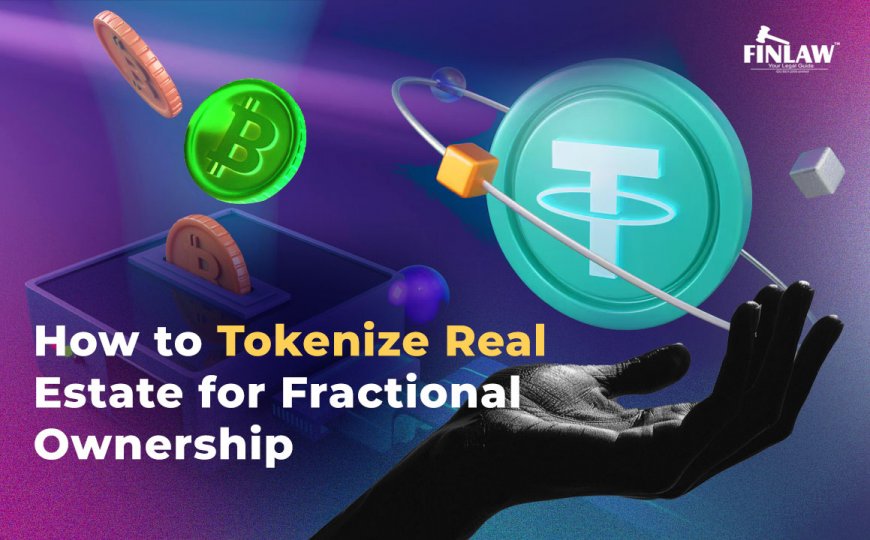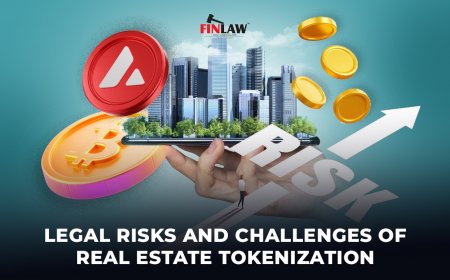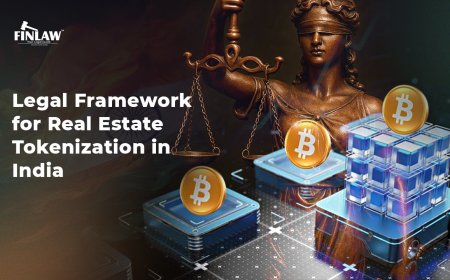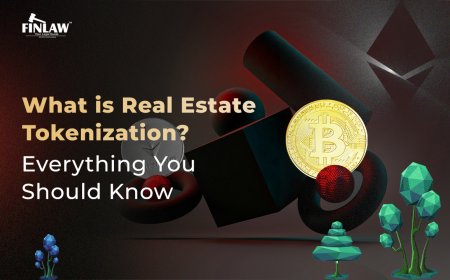How to Tokenize Real Estate for Fractional Ownership
Learn how to tokenize real estate in India with our step-by-step guide on fractional ownership, legal setup, compliance, and benefits.

Tokenization is one of the most exciting financial innovations of the decade, combining blockchain with tangible real-world assets. By converting property ownership into digital tokens, tokenization allows fractional ownership, easier trading, and broader investor participation.
For Indian investors and developers, learning how to tokenize real estate is increasingly relevant. The Indian real estate market is valued at over USD 250 billion and is projected to grow steadily, yet it is often criticized for being illiquid and inaccessible to smaller investors. Tokenization directly addresses these challenges.
In this guide, we’ll explain the concept, step-by-step process, regulatory considerations in India, global examples, taxation rules, benefits, risks, and an actionable checklist to get started.
What Is Real Estate Tokenization?
Real estate tokenization is the process of creating digital tokens that represent ownership or rights in a real estate asset. These tokens are issued on a blockchain and can be bought, sold, or traded.
Each token acts like a digital share in the property, providing investors with legally recognized rights such as:
-
A fractional share in the property itself
-
A claim on rental income
-
Participation in future profits from a development project
This is why tokenization is often called fractional real estate ownership powered by blockchain.
Why Tokenization Is Transforming Real Estate
Before diving into how to tokenize real estate, it’s important to understand why it matters.
-
Lower Entry Barriers: Instead of investing ₹50 lakh in an entire apartment, investors can buy tokens worth as little as ₹50,000.
-
Liquidity: Traditionally, selling real estate takes months. With tokenization, fractions of ownership can be traded much faster.
-
Global Investor Access: NRIs and international investors can participate seamlessly through blockchain-based tokens.
-
Transparency: Blockchain ensures a secure, immutable record of transactions.
-
Diversification: Investors can spread their money across multiple tokenized properties instead of locking it in one asset.
How to Tokenize Real Estate: A Step-by-Step Guide
The process involves legal, financial, and technological steps. Here’s a practical roadmap for developers and asset managers in India:
Step 1: Identify the Asset and Investment Model
-
Choose whether you want to tokenize a commercial building, residential project, land, or rental income stream.
-
Define the investor structure: will tokens represent direct ownership, shares in an SPV, or debt instruments secured against the property?
Step 2: Create a Legal Wrapper (SPV or Trust)
Most real estate tokenization projects in India use an SPV (Special Purpose Vehicle). The property is transferred to the SPV, and tokens represent fractional shares in that entity. This ensures enforceable rights under Indian corporate law.
Step 3: Ensure Regulatory Compliance
Since most tokenized real estate projects are treated as securities, you must comply with SEBI rules and, if operating in GIFT City, with IFSCA guidelines. Many issuers apply to regulatory sandboxes to test token offerings safely.
Step 4: Draft Legal Documentation
-
Investor agreements
-
Private placement memorandum
-
Token issuance terms
-
Shareholder agreements
These documents must clearly define the legal link between tokens and property ownership.
Step 5: Choose Blockchain and Token Standards
-
Public blockchains (Ethereum, Polygon) are popular for global accessibility.
-
Permissioned blockchains (Hyperledger, Corda) are often preferred by institutions.
-
Use token standards like ERC-1400 (security tokens) for compliance.
Step 6: KYC/AML Onboarding
Integrate investor verification to comply with India’s anti-money laundering laws. This step builds trust and ensures legal safety.
Step 7: Token Issuance and Custody
Tokens are minted once investor funds are cleared. Both the blockchain ledger and the SPV’s shareholder register must be synchronized.
Step 8: Enable Secondary Market Trading
Provide liquidity by listing on licensed exchanges or private trading platforms. Secondary market trading must comply with securities laws.
Step 9: Manage Investor Distributions
Use smart contracts to automate rental income payouts, dividends, or profit sharing. Regular reporting strengthens investor confidence.
India vs Global Tokenization Models
Globally, tokenization has already gained traction:
-
United States: Platforms like RealT and Securitize enable fractional ownership of residential and commercial properties.
-
Europe: Germany and Switzerland have created legal frameworks for real estate tokens.
-
Middle East: Dubai’s Virtual Assets Regulatory Authority (VARA) has been active in shaping tokenization rules.
India is catching up, with IFSCA and SEBI exploring frameworks. Early movers in India often pilot tokenized projects through GIFT City, which offers a regulatory sandbox for financial innovation.
Taxation of Tokenized Real Estate in India
Investors must be aware of how tokenized assets are taxed:
-
Rental Income: Taxed as income from property or business income, depending on the structure.
-
Capital Gains: Sale of tokens attracts capital gains tax — short-term or long-term depending on holding period.
-
GST: Platform services may attract GST, especially for management or facilitation fees.
Consultation with tax advisors is strongly recommended, as taxation rules for digital securities are evolving.
Benefits of Tokenization for Developers and Investors
-
For Developers: Access new pools of investors, raise funds faster, and improve liquidity for projects.
-
For Investors: Gain access to premium properties, diversify risk, and enjoy potential liquidity through secondary markets.
Challenges and Risks to Watch Out For
-
Regulatory Uncertainty: India has not yet finalized clear guidelines for tokenized securities.
-
Liquidity Illusion: Secondary markets may take time to develop.
-
Smart Contract Risks: Vulnerabilities can lead to hacks or loss of funds.
-
Legal Enforceability: Tokens must map to enforceable rights; otherwise, investors may face disputes.
Mitigating these risks requires strong legal structures, third-party audits, and transparent governance.
FAQs on How to Tokenize Real Estate
Q1. Is real estate tokenization legal in India?
Yes, but it must be structured carefully. Tokens are likely to be treated as securities, requiring compliance with SEBI or IFSCA regulations.
Q2. Can retail investors participate?
Retail participation is possible but depends on the classification of the token and the regulator’s stance. Many early projects focus on accredited investors.
Q3. Which blockchain is best for tokenization?
Ethereum and Polygon are popular due to their global adoption, but institutions may prefer permissioned chains like Hyperledger.
Q4. How do I start tokenizing a property?
The first step is setting up an SPV, ensuring compliance, and drafting legal documents. From there, you can work with a blockchain development partner to issue tokens.
Final Thoughts
Understanding how to tokenize real estate is key for developers, fintech startups, and investors who want to stay ahead of the curve. Tokenization promises to make India’s property market more liquid, inclusive, and transparent.
However, success depends on building the right legal and technical foundation. Developers should start small — using SPVs, pilot projects, and regulatory sandboxes — before scaling. For investors, tokenization offers a chance to access premium assets like never before, but due diligence remains critical.
With India moving toward clearer regulations through bodies like SEBI and IFSCA, the future of real estate tokenization looks promising.
What's Your Reaction?



















